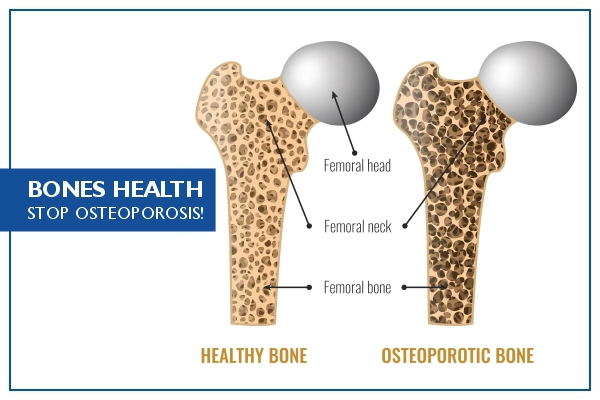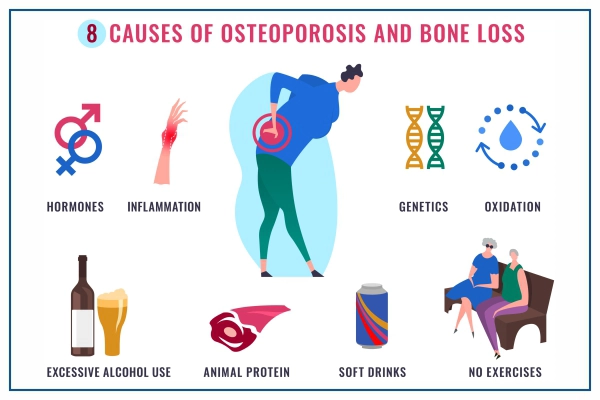Osteopenia(Low Bone Density)
Osteopenia is weakening of the bones caused by a reduction of bone mineral density (BMD). It affects people over the age of 50, particularly women. Although there are no symptoms or indicators of osteoporosis, a painless screening test can be used to assess bone strength. Changing your lifestyle can help you maintain bone density and avoid osteoporosis. Let us look at the most common symptoms, causes, risk factors, diagnosis and treatment.

Symptoms
Osteopenia normally does not comes by itself until it has increased to osteoporosis. Patients with osteopenia may have the following symptoms -
- Bone discomfort
- Bone weakness
- Bone pain
Causes and Risk Factors
Vitamin D deficiency causes osteopenia, which can lead to osteoporosis. It also causes osteomalacia, a painful bone disease that increases muscle weakness and raises the risk of falls and fractures. Living tissue makes up bones. A healthy person builds more bone than he or she loses until around the age of 30. However, after the age of 35, bones begin to break down quicker than they can be rebuilt. Bone density falls by less than 1% every year in healthy people throughout their lives.
Some factors can accelerate bone loss, resulting in osteopenia, such as:
- Hyperthyroidism
- Medications such as prednisone for cancer therapies, as well as heartburn, high blood pressure, and seizures medications.
- Hormonal changes that occur during menopause.
- Nutritional deficiencies, particularly a diet deficient in calcium and vitamin D.
- Gastrointestinal surgery, which might impair the body's capacity to absorb essential nutrients and minerals.

Risk factors
Following are the risk factors for getting osteopenia-
- Diet: People who eat a low-vitamin D, low-calcium diet are more likely to develop osteopenia. Excessive alcohol use can also reduce the ability of the bones to absorb calcium.
- Smoking: Calcium aids in the development of strong bones. Smoking reduces the amount of calcium that the bones can absorb, which can hasten bone loss.
- Medications: It includes certain drugs, especially those taken over long periods of time, which might cause bone loss. Some anti-seizure medications, cancer treatments, and steroids, for example, can cause a loss of bone density.
- Certain medical diseases: Diseases such as lupus, rheumatoid arthritis, and celiac disease, might also raise a person's risk of developing osteopenia.
Minerals such as phosphate and calcium are found in the bones, making them strong and dense. The more brittle the bones become, the more likely they are to break.
Prevention
There are a few things you can do to keep your bones strong and avoid bone loss:
- Inquire about your family's medical history, especially about osteoporosis.
- Inquire about your own medical history, such as medications you've used, medical issues you've had, and lifestyle decisions you've made, among other things.
- Examine your physical condition.
- Prescribe a bone density test.
Treatment
Although there is no cure for osteopenia, it is critical to maintain bone density as much as possible. Simple techniques to keep your bones as healthy and strong as possible and avoid osteoporosis progression include:
- Treatment with calcium.
- Exercise
- A balanced diet is essential
- Supplements for vitamin D deficiency and sun exposure to aid vitamin D absorption.
In the event that you develop osteoporosis, your healthcare professional will want to track your bone density over time.
